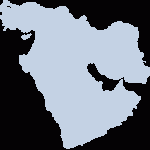Thursday
Feb182010
Iran's Nukes: The Latest IAEA Report (18 February)
 Thursday, February 18, 2010 at 17:38
Thursday, February 18, 2010 at 17:38  The latest findings of the International Atomic Energy Agency on Iran's nuclear programme. The full text is available via Arms Control Wonk.
The latest findings of the International Atomic Energy Agency on Iran's nuclear programme. The full text is available via Arms Control Wonk.Snap reaction? For all the bluster you will get over this report in the next few days, there is nothing new here, only the same old questions. The lack of "proof" of Iran's misdeeds is in the Agency's reference to "non-diversion of declared nuclear material", but the IAEA still has concerns that it has not been able to carry out a comprehensive inspection. These are expressed in almost the exact same language as in the 2009 reports, except for the addition of Ahmadinejad's promise of "ten new enrichment plants". Instead of calling doubt on the feasibility of this ambition, the IAEA gets sucked into speculative worries about the extent of Iran's plans. Look for this to be jumped on by those advocating harsher action against Tehran:
Latest on Iran (18 February): Watching on Many Fronts
SUMMARY
46. While the Agency continues to verify the non-diversion of declared nuclear material in Iran, Iran has not provided the necessary cooperation to permit the Agency to confirm that all nuclear material in Iran is in peaceful activities.
47. Iran is not implementing the requirements contained in the relevant resolutions of the Board of Governors and the Security Council, including implementation of the Additional Protocol, which are essential to building confidence in the exclusively peaceful purpose of its nuclear programme and to resolve outstanding questions. In particular, Iran needs to cooperate in clarifying outstanding issues which give rise to concerns about possible military dimensions to Iran’s nuclear programme, and to implement the modified text of Code 3.1 of the Subsidiary Arrangements General Part on the early provision of design information.
48. Contrary to the relevant resolutions of the Board of Governors and the Security Council, Iran has continued with the operation of PFEP and FEP at Natanz, and the construction of a new enrichment plant at Fordow. Iran has also announced the intention to build ten new enrichment plants. Iran recently began feeding low enriched UF6 produced at FEP into one cascade of PFEP with the aim of enriching it up to 20% in U-235. The period of notice provided by Iran regarding related changes made to PFEP was insufficient for the Agency to adjust the existing safeguards procedures before Iran started to feed the material into PFEP. The Agency’s work to verify FFEP and to understand the original purpose of the facility and the chronology of its design and construction remain ongoing. Iran is not providing access to information such as the original design documentation for FFEP or access to companies involved in the design and construction of the plant.
49. Contrary to the relevant resolutions of the Board of Governors and the Security Council, Iran has also continued with the construction of the IR-40 reactor and related heavy water activities. The Agency has not been permitted to take samples of the heavy water which is stored at UCF, and has not been provided with access to the Heavy Water Production Plant.
50. The Director General requests Iran to take steps towards the full implementation of its Safeguards Agreement and its other obligations, including the implementation of its Additional Protocol.
51. The Director General will continue to report as appropriate.




